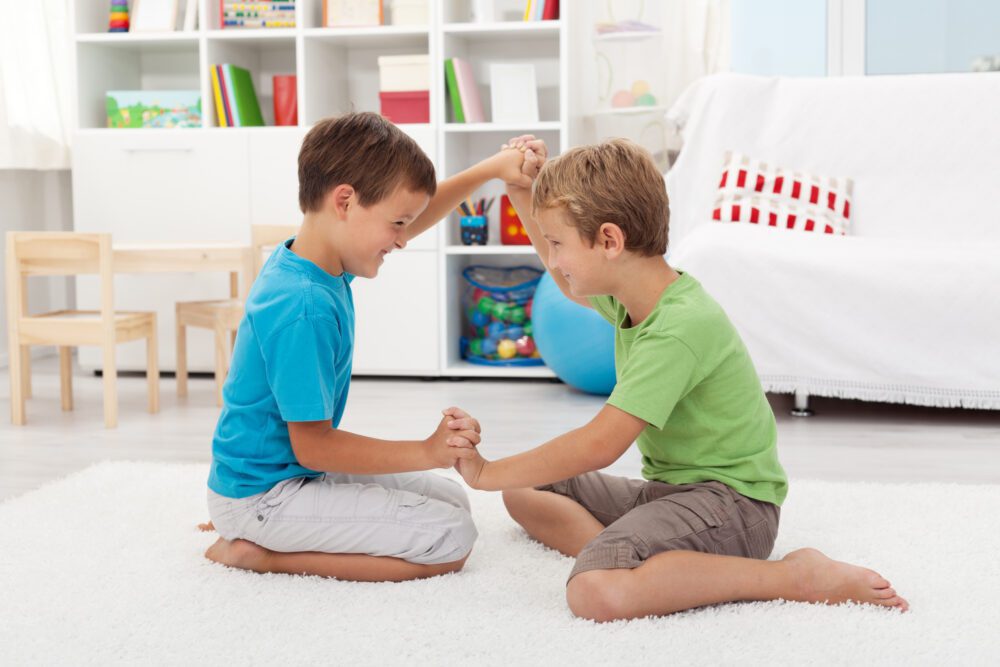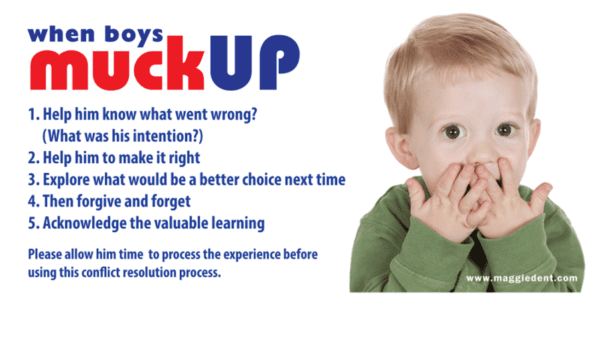Newsletter Articles, Posts for Parents, Raising Boys
Help me stop my son from hitting, slapping and kicking!

Every month in my membership community Q&As, I have questions from frustrated parents about little boys hitting, kicking and slapping. So in this blog, I want to explore some of the reasons why our boys, especially boys under six, can struggle with this form of physicality and how you can help them.
Also, I just want to clarify at the outset that this article is not specifically going to address these behaviours in neurodivergent boys, however some of the accommodations may be helpful for our boys with ADHD or other sensory challenges.
My first message is that boys who are struggling with this behaviour are not being ‘bad’ or ‘naughty’. Those parents among you who were raised at a time when children’s behaviour was only seen through the lens of good versus bad, and that the only way to change bad behaviour was through punishment, can find the early years of a boy’s life particularly challenging. This perception is based on the belief that boys are deliberately doing these things and that implies intention. In reality, nothing could be further from the truth for most boys.
Why is he doing it?
When we explore the development of young boys and young girls, the research is very strong that there are significant differences. Sometime during gestation, boys’ development, particularly brain development, becomes delayed. When you add into the mix the biological drivers that come in on our DNA, that boys are wired to become defenders and protectors, and the dominant hormone is testosterone rather than oestrogen, which is the bonding connecting hormone, some of the why becomes more obvious.
The cognitive delay impacts the capacity of boys in the development of language and access to their left brain (or more logical brain). In my Girlhood book, I shared my observation of my first granddaughter at the age of 18 months when I saw her deep in thought. Following her pondering, she approached her daddy and asked for a biscuit. Her capacity at such a young age to consider her options and determine which approach would give her the best chance of getting what she wanted blew me away. This is an example of her being able to access her left brain to be able to make a choice from her right brain. This is also one of the reasons why in adolescence, it is around 75% more boys who get injured due to risky choices, become perpetrators of crime and tragically die by suicide. Many of these are spontaneous, impulsive choices.
Michael Gurian, a well-respected expert on boys, argues that the difficulty for boys to access their left brain impacts their capacity to respond to logic and to verbal instructions and guidance. The right side of the brain has so much more to do with the big picture of activity and of doing! Impulse control needs access to the executive function of the brain, usually via the left brain. It is developing slowly in the early years, and for many five-year-old boys, they can still be struggling with the need for instant gratification and have an inability to manage impulses, especially when the nervous system is struggling to cope.
Also, most young boys are trying to manage the interoception of their nervous system. Inside every human, the brain and the body are working closely together to ensure that there is enough energy within the nervous system to enable the full functioning of the human body, not just to have enough energy to run around.
Dr Lisa Feldman Barrett and Dr Mona Delahooke in their groundbreaking work, explain that we all have a body budget. When that body budget is depleted or overloaded, the brain perceives there is a threat to survival, and the body will be flooded with cortisol, the stress hormone. This can feel really uncomfortable and one of the ways that little children, especially young boys, discharge excess cortisol is through sudden, often explosive movement of the body.
Given that boys are wired for movement (partly biological), and the testosterone helps with that, then one of the ways that they release stress from the nervous system is through their body – through kicking, hitting, slapping, running, jumping and wrestling.
When boys muck up
Research shows that when the amygdala is fired up in girls, the next centre to fire up in the brain is the word centre. This is why often girls are ready to talk about something immediately after they become upset and also why they can get stuck in negative ruminating loops. In boys, after the amygdala is fired up the next centre in the brain to be fired up is the body. It could take many hours, for the word centre to be able to be accessed for many boys.
This is why I have created these steps as a guideline to helping when boys muck up with their physical impulsivity.

Recent research is showing that the development of impulse control is being delayed by screen use. Indeed, because of the instant nature of most of the activities and apps, many boys are not developing the skills to pause, reflect and remember how to make better choices until much later than they did prior to the arrival of screens. The excessive creation of instant dopamine that happens with much screen activity can also mean that boys will be less inclined to create play opportunities in the real world, as they hunger for the instant buzz. Reducing screen time in the early years for boys who are struggling with impulse control, is one of Michael Gurian’s key recommendations.
Check your expectations
Another key area of distress for boys, which can be a trigger for an unhealthy level of physicality, is when the systems around them have the same developmental expectations for girls and boys. This is especially when we expect them to have capacity to sit still on the mat, to be able to stay focused on an activity that they find difficult, to be able to recall all the rules and expectations within an education setting, and with an inability to move their body frequently to discharge the cortisol that accumulates. Now, of course, some girls struggle with these things too, but largely, we’re seeing boys being disciplined around these things at far higher rates than girls.
If boys are unable to access their executive brain as easily as girls, they will be struggling to feel good about themselves, and they can then attack their own self-worth.
Two really big emotions boys often struggle with are frustration and embarrassment. Often boys who get in trouble for spontaneous physicality will then call themselves ‘dumb’ or ‘stupid’ when they are being sanctioned. Most boys feel really awful when they realise that they have hurt other kids and, again, that self-shame can trigger more big feelings, and even more hitting and kicking. A helpful phrase for when this happens is “I don’t think you meant to hurt anyone…”
Asking a young boy in an early childhood setting to “use his words” rather than kick and hit, is not only unhelpful but also disrespectful. He does not yet have that capacity, and being reminded of yet another thing that he is doing wrong can increase the triggers for hitting or kicking or running away.
Why boys often play rough
Another area that is really misunderstood is around boys and their play. Given that boys do not have the same capacity to organise their thoughts, to understand their emotions and communicate their needs and express them in play, they use their physicality for connection. Aggression nurturance is a term used to describe why boys often hit, slap, shove or wrestle other boys and their siblings.
So often this is misinterpreted, as a deliberate intention to hurt. When in reality, it is an intention to connect without words.
Boys do not tend to playfully hit, slap, or shove kids they don’t like. This becomes an incredibly interesting dynamic when boys turn 13 to 14. As a former high school teacher, boys in my class were almost like wrestling gorillas at times – all in the hunt for having fun. The fastest way to move cortisol, is through laughter and lightness and through movement of the body.
When boys play rough and tumble or do roughhousing or play superhero play they usually have no intention to hurt. It’s called ‘aggression nurturance’ and it is about connection, not conflict. They will make mistakes and need parents to have conversations about ‘the line in the sand’ where other kids can be hurt. They need to know about remorse and saying sorry, even though understanding remorse is an age-driven concept. Intentional hurting of others needs to be handled very differently to unintentional hurting.
It can be very helpful for parents to engage in rough and tumble play with their boys too, not only because it’s good for the brain, but it can help them learn that there are limits to this kind of play. Given the inability for toddlers and even early primary school boys, to be able to identify and then communicate their needs, it might now seem obvious why at times they will just come and kick you when unable to have something they really want.
It can be helpful to validate his feeling in that moment with a gentle warm voice – “I know you wanted the biscuit and I know you’re upset that I’ve said no, however, we don’t have biccies before dinner.”
Yes, we do need healthy boundaries, but be prepared for the need for our young boys to discharge their cortisol, and sometimes we will cope with it better than other times. Janet Lansbury has some excellent articles on her website that will help you in navigating the toddler years.
Sometimes a boy may run fast and collide with a loving parent after a day of separation. This is often his way of telling you that he missed you lots, not an attempt to hurt you.
Rooster boys, or our high-energy boys, tend to be much harder to coach and educate around managing their body budgets. I tended to prioritise at least ½ an hour of high-energy activity before we went anywhere outside the home so that I knew we could get at least 20 minutes where their body budget would be in a healthy zone.
Given that I had four boys, and knowing that things could change quite rapidly, I was always prepared to leave when I noticed one of my boys struggling to contain the need to move.
Being a constant CSI detective around your boy’s body sensations or quirks can really help avoid the flooding of the nervous system when their body budget has blown out or is completely depleted.
To be honest, I rarely took my sons to coffee shops until they were in the late primary to secondary years because it would usually end in me leaving quickly and regretting ever having had children!
It just was not a good environment for them. It was so much easier to grab a takeaway coffee, and head to a park or an oval.
The link between environment and stress behaviour
The last area of consideration around boys’ inappropriate and worrying physicality is the environment they are in. Generally, boys who feel safe and emotionally connected to their grown-ups, and that includes educators, carers and teachers, tend to manage their body budget better. However, if they feel they are constantly being growled at, have their name put on the blackboard, losing recess or are being shamed, then this behaviour will escalate.
Sometimes doing too many things after school can be too much for the body budget.
School days are exhausting for most boys, and even if they have had a good day, they can have meltdowns in the car because they have nothing left. That is a depleted body budget, which you can start restoring immediately.
This is why I would recommend feeding them straight away, making them laugh, sing their favourite songs or head straight to a park. A small random fart can also work a treat at this time. Please avoid interrogating your son as it can trigger more cortisol.
Teaching our kids about energy in the body can be so helpful. Help your boy understand his body sensations so that he can sense when he is feeling unsettled. Teach him to move without hurting himself, others or the world around him.

Jumping, running on the spot, big breaths, bouncing on a trampoline, punching a special tough cushion or using a fidget toy are all ways that can help.
Teaching calming strategies can also be effective and doing ‘Round and Round the Garden’ in the palm of their hand, can be deceptively calming. The key is to teach just one thing that they can automatically do, like a habit. If you work with your son and work out which strategy he would like to practice, there is a much better chance he will be able to master it – gradually.
What else can help?
- Explore his environment for stressors. Build stronger connectedness – fill his love cup.
- One-on-one time – regularly.
- Keep hydrated with water.
- Quiet bath or bedtime chats about choices.
- Shift cortisol with novelty, laughter and lightness.
- Lower stimulation of senses – noises and bright lights around home.
- Avoidance of small screen activity – TV is better.
- Read to him often – including books on kindness and building empathy.
- Check his diet – junk foods and excess sugar can deplete his body budget.
- Ensure plenty of sleep. (Lack of sleep really impacts impulse control).
- Create plenty of play opportunities with mixed-aged, mixed-gender groups with little adult supervision.
- Increase time in nature.
- Add water – bath, shower, beach or hose!
- If you have the funds get a trampoline or monkey bars.
- Consider getting a good dog.
- A martial arts class can be helpful at building delayed gratification.
- Prioritise physical movement throughout the day as needed.
- Teach the power of pause… Count from 5 down.
- Avoid constant “don’t” and “stop it” and growling and shouting.
- Use my audio Calming the Angry Ant (I am gifting it here to those of you who’re reading this blog. Click here to download)
- If concerned, consider an OT appointment around self-regulation.
The more fiercely and unconditionally loved a boy feels, the more likely he will be to follow your guidance and your modelling. The more energy in his body budget, and the calmer his nervous system the less likely he will impulsively hit, kick and slap in a problematic way.
So to all those frustrated parents, I hear from regularly, I hope this has helped. If you are looking for a deeper explanation for all things about boys developmentally from the early years to adolescence, then my Mothering our Boys book explores that – and yes fathers and other people can ‘mother’ as well.
PS. I want to make a disclaimer that gender is more fluid than fixed and while respecting biological, neurological and hormonal differences – there is not an ‘all boys’ or ‘all girls’ reality. So when I use the term boys I am referring to a statistically significant number of boys however much of what I share may also be relevant to girls or gender diverse people. In all my articles, I encourage you to take what feels right for your child and to leave the rest.
Blog image credit: © by ilona75 /Depositphotos.com




